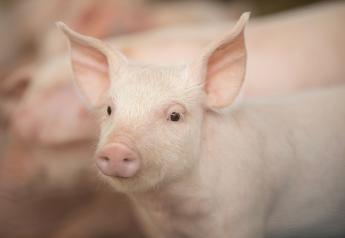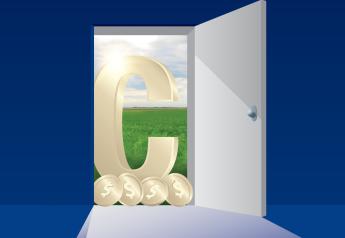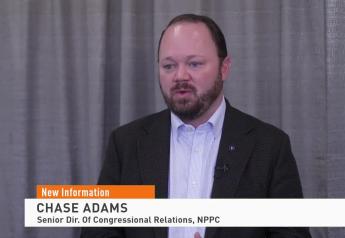Proposition 12 is Not the Way We Want to Care for Animals, Hays Says

It's been quite a year in U.S. agriculture, National Pork Producers Council (NPPC) President Terry Wolters told a crowd of journalists at NPPC’s media roundtable on Thursday.
With no shortage of examples to share, Wolters explained how it’s been an unprecedented time to raise pigs. From the labor shortage to disease threats and from a challenging trade environment to record-high grain prices and energy costs. Throw in a little inflation and it’s been a challenging environment at best.
“But meanwhile, there’s a backdrop of new pending legislation that could threaten farmers’ ability to effectively care for their animals,” he says. “Legislation that challenges this way of living, not to mention impacts the consumer and the pork supply chain.”
More than 100 pig farmers flew in for NPPC’s fall Legislative Action Conference in Washington, D.C., on Sept. 14-15 to meet with members of Congress to discuss various issues of importance to the U.S. pork industry. Of the many issues on the minds of producers this week was California’s Proposition 12.
“October 11, 2022 – remember this date,” Wolters urged. “This date is an impactful date not only to the U.S. pork industry, but also to states across the country as it sets the precedent for states to regulate or not regulate what goes on outside their borders. We feel this is an unconstitutional overreach that will impact future generations of pig farmers and pork production, along with consumer impacts.”
On Oct. 11, NPPC and the American Farm Bureau Federation (AFBF) will present their case before the U.S. Supreme Court why the appeals court judgment upholding Proposition 12 should be reversed.
“Proposition 12 is unconstitutional,” said Michael Formica, chief legal strategist for NPPC. “It reaches thousands of miles outside of the state of California, imposes very prescriptive standards on farmers that have no contact with the state of California, and will force them to incur millions of dollars in renovations to their farms and host inspectors from the state of California to their farm.”
Ironically, what was done in the name of improving animal welfare, will significantly decrease the welfare, health and the safety of those animals, Formica explained.
And the issue goes well beyond the pork industry, said Travis Cushman, deputy general counsel for AFBF. It’s an issue that all farmers could face at some point in all types of farming activities.
Cushman pointed out that AFBF shares California’s goal of ensuring animals are well cared for. Unfortunately, Proposition 12 won’t accomplish this.
Scott Hays, a fifth-generation, northeast Missouri pig farmer, expressed his family’s frustration about the animal welfare aspect of Proposition 12.
“We've spent well over a century raising pigs on the same farm. I vividly remember conversations with my dad and grandpa about our pigs and how we can raise them better, how we can make their life better,” Hays said. “It's just known in our family if the pigs do well, we do well.”
At one point, he said his dad and grandpa built feeding stalls in dirt lots when pigs were outside because of the aggressive behavior of pigs, especially around feeding time. It didn't work, but they tried, he said.
“We're five generations deep raising pigs and now we have some folks that know nothing about raising pigs, or very little about raising pigs, telling us how it should be done,” Hays said. “We've done it that way – because that's the only way we could do it 50 years ago. It doesn't work. It feels like we are going backwards in animal care. It’s not the way we want to care for our animals.”
More Clarification Needed
The California Department of Food and Agriculture announced its completion of the implementation rules on Sept. 7, the same day NPPC and AFBF’s reply brief was filed with the Supreme Court - more than three years after the original statutory deadline. The state’s animal housing regulations are effective Sept. 1, 2022.
Although Formica said there weren’t any big surprises in the rules, there are some areas where more clarification is needed, especially with regards to the stand up, turn around provision and some of the technologies that producers are looking at to comply with Proposition 12, he said.
NPPC also has questions about timing and enforcement. While California has delayed the requirement for farms to be certified until January 1, 2024, rule package states that Proposition 12 goes into effect immediately despite a Sacramento Superior Court order that has enjoined enforcement of Prop 12 until at least March 1, 2023.
“What does that mean?” Formica said. “From the retailer's perspective, if the permits California is going to require aren’t required for two years, then how do they comply with the law in that two-year period? How does a grocery store do that? How does a producer try and produce pork for that market?”
More from Farm Journal's PORK:
Ironic Timing: NPPC, AFBF File Reply Brief on Prop 12, CDFA Finalizes Rules
Proposition 12 Compliancy: Don't Do It for Free, Hollis Says







